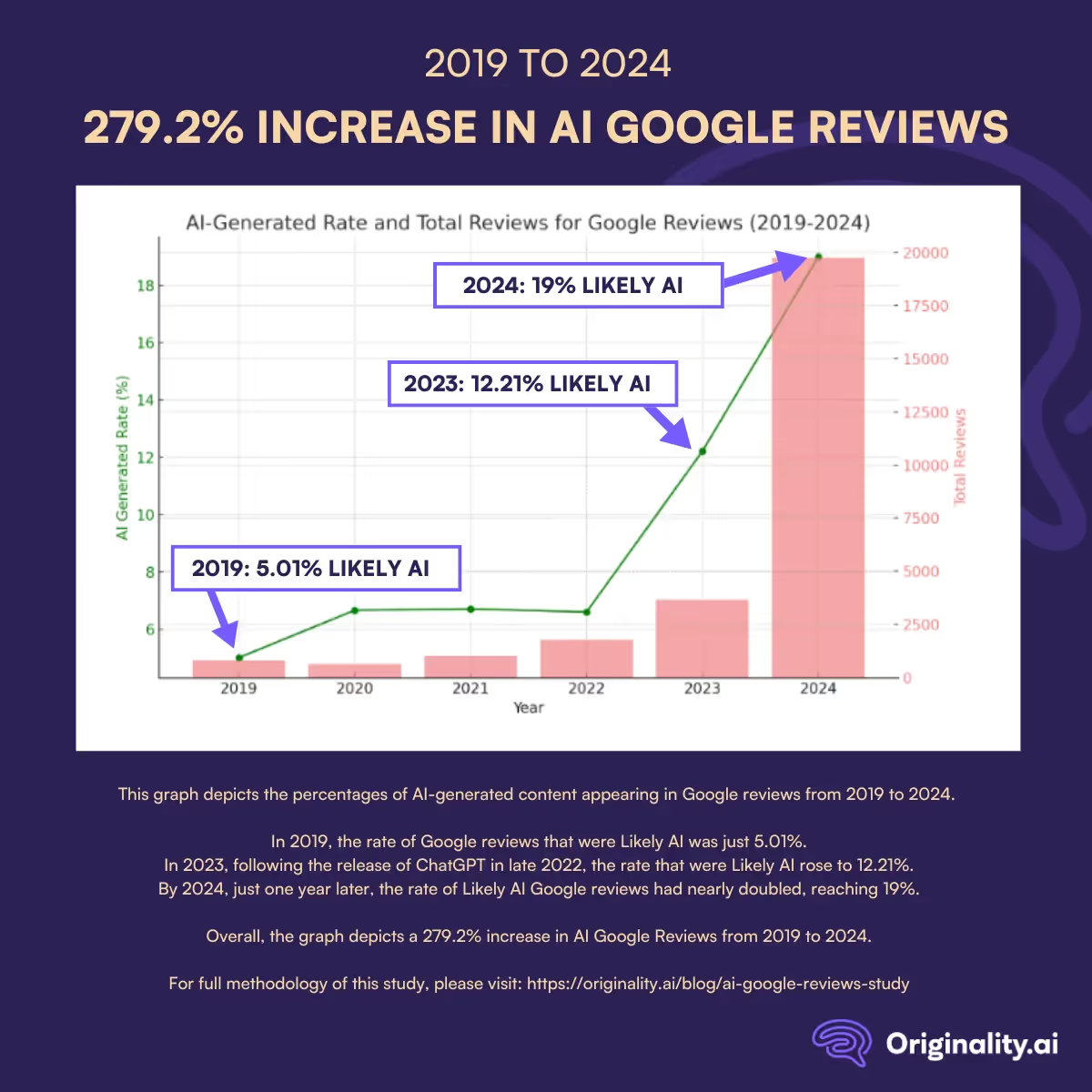The importance of Google Reviews cannot be overstated.
Sure, brands may tell you that they are the best at what they do, as it’s their job to convince you that is the case.
One way to check whether or not that was true — whether a particular brand really was the best — was to look at Google reviews.
After all, who is better placed to tell you whether or not a brand meets expectations than a fellow consumer?
That said, the rise of AI-generated content has brought online reviews into question. We are all aware that AI-generated reviews exist, but to what extent?
In this study, we aim to identify the true impact of AI-generated content in the context of Google reviews to help businesses and consumers better understand what they are reading online.
Overall, our analysis aims to discuss what the effects could be for consumers and businesses and what people should do to help counteract the rise in generated content.
.avif)
.avif)
The pie chart above reveals a clear division between AI-generated and human-generated Google reviews in 2024.
Notably, 19% of the reviews were identified as AI-generated, while the majority, 81%, were created by humans.
This distribution highlights that while AI is playing an increasingly prominent role in content generation, it remains secondary to human authorship, at least for now.
Yet, the fact that nearly a quarter of the reviews are AI-generated is significant and signals the growing integration of AI tools in digital content.
Businesses might be leveraging AI to streamline review generation, fill gaps in feedback, or create a more robust online presence.
Further, the presence of 19% of reviews as AI also raises important ethical and practical questions.
If used irresponsibly, AI-generated reviews could mislead consumers and harm brand trust. Businesses may face scrutiny from platforms and consumers if the use of AI in reviews becomes too prominent or is perceived as deceptive.
The appearance of any AI-generated content suggests that monitoring and regulation, such as through AI detection, may be needed to ensure transparency and maintain consumer trust.
The fact that 81% of reviews in 2024 were human-generated reviews indicates a continued reliance on organic feedback.
This is likely driven by the perceived authenticity and relatability of human-written reviews.
It suggests that consumers are still actively contributing their own reviews and are more likely to trust or engage with content that reflects genuine human experiences and emotions.
However, this could change in future, as AI becomes increasingly integrated into everyday life.

The data reveals a sharp increase in the rate of AI-generated reviews between 2019 and the end of 2024. In 2019, the AI-generated review rate stood at 5.01%.
By the end of 2024, this rate had climbed dramatically to 19%.
This reflects a 279.2% increase from 2019 to 2024.
The substantial growth of Google reviews that are Likely AI highlights:
The significant jump in the rate from 12.21% in 2023 to 19% by the end of 2024 may indicate a tipping point where AI-generated reviews are no longer a marginal phenomenon but a mainstream element of review platforms.
This underscores the importance of understanding the implications of AI-generated content for both consumers and businesses.
For businesses, the increase in AI review rates presents both opportunities and risks.
Platforms must invest in advanced AI detection tools and transparent policies to address these challenges and maintain credibility.
From a consumer perspective, the growing prevalence of AI-generated reviews may create uncertainty around the authenticity of feedback.
If consumers lose confidence in the reliability of reviews, it could impact purchasing decisions and the perceived value of online feedback systems.
In conclusion, the rapid rise in AI-generated review rates from 5.01% in 2019 to 19% by the end of 2024 signals a profound transformation in the digital review landscape.
While 19% of AI-generated reviews showcase the potential of AI in augmenting digital interactions, the dominance of human-written content at 81% underlines the enduring importance of authenticity.
Businesses should carefully balance efficiency gains from AI tools with the necessity of fostering genuine consumer trust to succeed in the competitive online marketplace.
As this trend continues, businesses and platforms must prioritize transparency, authenticity, and trust to navigate the evolving challenges and opportunities presented by AI-generated content.
Not sure if a review you’re reading is human-written or AI-generated? Use the best-in-class Originality.ai AI Checker to find out.
1.1 Geographic Locations
The study targets the 15 most populous North American cities, using their names and geospatial coordinates to ensure search results focus within city boundaries.
1.2 Categories
Twenty predefined categories (e.g., “hospital,” “pharmacy,” “restaurant”) were selected to capture reviews from various public, commercial, and cultural establishments.
2.1 Place Discovery
Using the Google Places Text Search API, queries for each city-category pair include:
Paginated results are retrieved systematically by handling next_page_token responses.
2.2 Review Retrieval
Place details and reviews are extracted via the Google Places Details API. Each request specifies:
The API returns up to five reviews per place, including text, rating, and timestamp, converted to a readable format.
3.1 Structuring Data
Reviews are stored as dictionaries containing establishment name, review text, rating, review date, and city name, ensuring consistency for analysis.
3.2 Incremental Saving
Data is saved to a CSV file after every 500 reviews to minimize memory usage and protect against data loss. Header rows and progress tracking ensure seamless recovery in case of interruptions.
3.3 Final Dataset
Remaining reviews are saved after processing all city-category combinations, ensuring a comprehensive dataset.

MoltBook may be making waves in the media… but these viral agent posts are highly concerning. Originality.ai’s study with our proprietary fact-checking software found that Moltbook produces 3 X more harmful factual errors than Reddit.